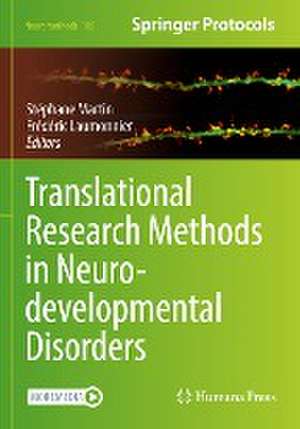Translational Research Methods in Neurodevelopmental Disorders: Neuromethods, cartea 185
Editat de Stéphane Martin, Frédéric Laumonnieren Limba Engleză Paperback – 2 oct 2023
Cutting-edge and practical, Translational Research Methods in Neurodevelopmental Disorders is a valuable resource for all researchers who want to learn more about this important and developing field.
| Toate formatele și edițiile | Preț | Express |
|---|---|---|
| Paperback (1) | 699.45 lei 6-8 săpt. | |
| Springer Us – 2 oct 2023 | 699.45 lei 6-8 săpt. | |
| Hardback (1) | 954.45 lei 6-8 săpt. | |
| Springer Us – 30 sep 2022 | 954.45 lei 6-8 săpt. |
Din seria Neuromethods
- 5%
 Preț: 347.57 lei
Preț: 347.57 lei - 15%
 Preț: 659.53 lei
Preț: 659.53 lei - 15%
 Preț: 665.08 lei
Preț: 665.08 lei - 18%
 Preț: 986.63 lei
Preț: 986.63 lei - 24%
 Preț: 852.89 lei
Preț: 852.89 lei - 18%
 Preț: 953.03 lei
Preț: 953.03 lei - 18%
 Preț: 955.25 lei
Preț: 955.25 lei - 20%
 Preț: 1129.36 lei
Preț: 1129.36 lei - 20%
 Preț: 1252.04 lei
Preț: 1252.04 lei - 18%
 Preț: 1291.45 lei
Preț: 1291.45 lei - 15%
 Preț: 652.31 lei
Preț: 652.31 lei - 18%
 Preț: 955.70 lei
Preț: 955.70 lei - 23%
 Preț: 705.39 lei
Preț: 705.39 lei - 18%
 Preț: 973.38 lei
Preț: 973.38 lei - 18%
 Preț: 964.86 lei
Preț: 964.86 lei - 18%
 Preț: 968.03 lei
Preț: 968.03 lei - 15%
 Preț: 662.95 lei
Preț: 662.95 lei - 15%
 Preț: 646.43 lei
Preț: 646.43 lei - 15%
 Preț: 649.71 lei
Preț: 649.71 lei -
 Preț: 395.29 lei
Preț: 395.29 lei - 19%
 Preț: 580.67 lei
Preț: 580.67 lei - 19%
 Preț: 584.12 lei
Preț: 584.12 lei - 19%
 Preț: 566.41 lei
Preț: 566.41 lei - 15%
 Preț: 652.17 lei
Preț: 652.17 lei - 15%
 Preț: 655.13 lei
Preț: 655.13 lei - 18%
 Preț: 959.36 lei
Preț: 959.36 lei - 15%
 Preț: 652.49 lei
Preț: 652.49 lei - 15%
 Preț: 649.54 lei
Preț: 649.54 lei - 15%
 Preț: 649.87 lei
Preț: 649.87 lei - 15%
 Preț: 650.19 lei
Preț: 650.19 lei - 15%
 Preț: 648.42 lei
Preț: 648.42 lei - 18%
 Preț: 1039.22 lei
Preț: 1039.22 lei - 18%
 Preț: 963.15 lei
Preț: 963.15 lei
Preț: 699.45 lei
Preț vechi: 822.87 lei
-15% Nou
Puncte Express: 1049
Preț estimativ în valută:
133.84€ • 140.11$ • 110.74£
133.84€ • 140.11$ • 110.74£
Carte tipărită la comandă
Livrare economică 05-19 aprilie
Preluare comenzi: 021 569.72.76
Specificații
ISBN-13: 9781071625712
ISBN-10: 1071625713
Ilustrații: XIII, 264 p. 50 illus., 44 illus. in color.
Dimensiuni: 178 x 254 mm
Greutate: 0.49 kg
Ediția:1st ed. 2022
Editura: Springer Us
Colecția Humana
Seria Neuromethods
Locul publicării:New York, NY, United States
ISBN-10: 1071625713
Ilustrații: XIII, 264 p. 50 illus., 44 illus. in color.
Dimensiuni: 178 x 254 mm
Greutate: 0.49 kg
Ediția:1st ed. 2022
Editura: Springer Us
Colecția Humana
Seria Neuromethods
Locul publicării:New York, NY, United States
Cuprins
Using Lentiviral shRNA Delivery to Knock-Down Proteins in Cultured Neurons and In Vivo.- Synaptosomal Preparation and Its Application in Preclinical Studies.- Assessing the Nanoscale Organization of Excitatory and Inhibitory Synapses using Recombinant Probes to Visualize Endogenous Synaptic Proteins.- Agonist-Induced Functional Analysis and Cell Sorting (aiFACS) to Select and Characterize Interneurons during Brain Development.- A CRISPR/Cas9-Based Toolkit to Test Gain- and Loss-of-Gene Function in Brain Organoids.- Assessment of Adult Mouse Brain NeuroAnatomical Phenotypes using Quantitative and Precision Histology.- Leveraging Microelectrode Array Technology for Phenotyping Stem Cell-Derived Neurodevelopmental Disease Models.- Humanized Chimeric Mouse Models to Study Human Neural Development and Pathogenesis of Brain Diseases.- In Vivo Manipulations to Correct for Behavioral Phenotypes in Cognitive Disorder Mouse Models.- Assessing Dyadic Social Interactions in Rodent Models of Neurodevelopmental Disorders.- Central and Peripheral Explorations by Metabolomics to Study Neurodevelopmental Disorders.- Genetic Engineering of Non-Human Primates Models for Studying Neurodevelopmental Disorders.
Textul de pe ultima copertă
This volume explores the latest techniques used to study neurodevelopmental diseases (NDD) that range from molecular aspects to integrated research approaches and brain imaging in living rodents. Chapters in this book cover topics such as protocols to deliver shRNA in vitro and in vivo using lentiviral particles to knock-down specific protein expression; experimental procedures to use recombinant fluorescent probes to visualize endogenous proteins at the mammalian synapse; CRISPR/Cas9 toolkit to assess either gain- or loss-of-gene function in brain organoids; detailed protocols to use in vivo manipulations to correct the behavioral phenotypes in cognitive disorder mouse lines; and experimental approaches to genetically engineer macaque models of NDDs and investigate how genetic predisposition may cause neural and functional alterations. In the Neuromethods series style, chapters include the kind of detail and key advice from the specialists needed to get successful results in your laboratory.
Cutting-edge and practical, Translational Research Methods in Neurodevelopmental Disorders is a valuable resource for all researchers who want to learn more about this important and developing field.
Caracteristici
Includes cutting-edge methods and protocols Provides step-by-step detail essential for reproducible results Contains key notes and implementation advice from the experts
